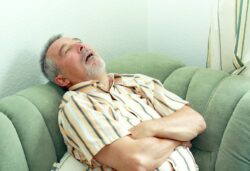Why Is Sleep Apnea More Common Among Seniors?
July 20, 2025
Many health conditions become more common with age, including diabetes, heart problems, and yes, even sleep disorders like sleep apnea. If you are a senior who has been struggling to feel well-rested, sleep apnea might be to blame! Why does this condition afflict so many older individuals, and what can you do to start getting the rest you need to feel and function your best? This blog post provides some practical information.
Sleep Apnea Among Seniors
According to one estimate, sleep apnea affects up to 20% of older adults. There are a couple of possible explanations for its prevalence:
- Changes in muscle tone. Muscles tend to weaken with age, and that includes the muscles in the airway! As the years pass, this could mean that the tissues in your throat are more likely to collapse, causing snoring and the repeated pauses in breathing that are characteristic of obstructive sleep apnea (OSA).
- Hormonal changes. For biological females, menopause marks a major hormonal shift, which can affect muscle tone and fat distribution. Whereas sleep apnea tends to affect more young and middle-aged men than women, post-menopausal women have about the same rate of OSA as older men.
How to Sleep Better
If you suspect you may have obstructive sleep apnea, taking proactive steps can make a meaningful difference in your sleep quality and overall health. Here are some strategies to help you manage OSA and enjoy more restful nights:
- Consult Your Doctor: If you regularly feel tired, have morning headaches, or your partner notices loud snoring or pauses in your breathing, talk to your healthcare provider. A sleep study can help diagnose OSA and other sleep disorders.
- Maintain a Healthy Weight: Excess weight can contribute to airway obstruction. Even modest weight loss may reduce the severity of sleep apnea symptoms.
- Adopt Side Sleeping: Sleeping on your back can worsen OSA by allowing throat tissues to collapse. Try sleeping on your side, perhaps by using a body pillow for support.
- Limit Alcohol and Sedatives: These substances relax throat muscles, increasing the risk of airway collapse. Try to avoid them, especially in the hours leading up to bedtime.
- Establish a Consistent Sleep Routine: Going to bed and waking up at the same time every day supports better sleep quality.
- Comply with Treatment: Many people find that a custom oral appliance from a dentist is an effective way to manage sleep apnea.
- Stay Active: Regular physical activity helps maintain muscle tone and supports better sleep health.
No matter your age, you deserve to get high-quality sleep! If you believe you have OSA, take steps today to manage the situation.
Meet the Practice
Drs. Yitta Garden and Kenneth Mogell are board-certified in dental sleep medicine. They work together to help patients of virtually all ages find effective and long-term relief from OSA via oral appliance therapy. To learn more about them and the services available in our practice, contact our Vero Beach location at 772-882-6800.
